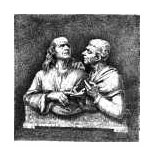
Inconsistencies in the Abortion Debate
AN APPEAL TO REASON
Emotions may blind us to the inconsistencies and absurd consequences of our positions on abortion. Precisely on an issue where emotions run high we need logical clarity. Each side of the abortion debate is capable of inconsistency, and we will look at both.
One inconsistency lies in the major media’s claims to objectivity and fairness, which contradict their indirect, perhaps even unintentional, biases. Although the country’s premiere newspapers and television networks seek to be impartial vehicles of the news, most of them fail when it comes to abortion. In an analysis published in the Los Angeles Times (July 1-4, 1990), David Shaw discussed at length the media’s manipulative use of language. This manipulation ranges from graphics focusing on women, rather than fetuses, to seemingly objective language that describes “harsh” “restrictions” on “women’s reproductive rights,” rather than “benevolent” “protection” of the “rights of unborn children” or simply “strict regulations.” The media also tend to employ the preferred labels of only one party: “pro-choice” or “pro-reproductive rights” (rather than “pro-abortion”) versus “anti-abortion” (rather than “pro-life”). Instead of weighing arguments, the media already manipulate language in such a way as to make the arguments seem superfluous.
Equally strange is the implicit media view that the Catholic Church should not advise politicians or enforce discipline on them. Catholics are voluntary members of a Church, receiving Sacraments that are a privilege conferred by ecclesiastics whose role it is to nurture a particular worldview and to discipline infractions. In earlier eras the Church’s strong stances on political issues — bishops denying Sacraments to slaveholders during the Civil War and to segregationists during the civil rights movement, or, more recently, supporting a nuclear freeze or protesting Reagan Administration economic policies — were heralded by the media.
Also of interest is the moral integrity of a politician who privately sees abortion as unethical but publicly condones it. The absurdity of the position is clear if we consider a parallel scenario: A politician claims to be anti-racist or anti-sexist, but, recognizing no consensus against racism or sexism, neither votes against nor defies racist or sexist laws. Could it be that the otherwise progressive politician fears that the biased media would only decry his anti-abortion stance?
You May Also Enjoy
The story of this repentant and reformed killer is an astounding tale of redemption and sacrifice that has inspired authors, playwrights, and filmmakers.
Clayton requested a "formal tie to the monastery" while in jail. He said he was already leading a monastic life and was eager for it to be embraced by the Church.
If her book were itself a criminal case being tried before a jury, the verdict in her prosecution of the death penalty "system" would be a resounding "not guilty."

